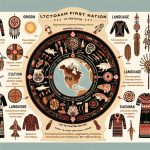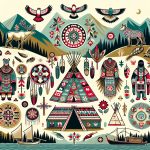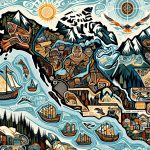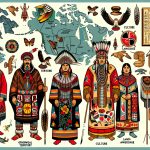Nestled amidst the dense, verdant forests of Northwestern Ontario, the Slate Falls Nation stands as a testament to resilience and deep-rooted cultural heritage. Originating from a diverse background of ancestral bands, this Ojibwe community, part of the larger Anishinaabe group, has thrived on the lands surrounding the Bamaji Lake for generations. Historically, the Slate Falls Nation were semi-nomadic, traversing vast territories that spanned forests, rivers, and lakes, living in harmony with the land that provided them sustenance, spirituality, and identity. Today, they reside in the Slate Falls Reserve, a place where modern challenges intertwine with a fierce commitment to preserving their ancient ways.
In contemporary geopolitics, the Slate Falls Nation navigates through treaties and governmental relations, striving to secure their rights while fostering a community that honors ancient traditions in a modern world. Their current situation mirrors the plight of many indigenous communities—battling for recognition, rights to their land, and the revival of their culture and language.
Organización social y política
Índice
The social fabric of the Slate Falls Nation is intricately woven through extended family lineages and clans, which play a pivotal role in maintaining the cultural and spiritual welfare of the community. Leadership is traditionally vested in a council of elders, who are respected for their wisdom and knowledge of ancestral lore. These elders, alongside the elected Chief, make decisions that resonate with both the ancestral laws and the contemporary needs of their people. Gender roles are distinctly defined yet fluid, allowing members to perform tasks vital for the community’s sustenance and spiritual health. Importantly, traditional systems such as the clan gatherings and council meetings remain vibrant, reinforcing the community’s governance and social cohesion.
Lengua
The language of the Slate Falls Nation is Anishinaabemowin, belonging to the Algonquian linguistic family. This language, a vessel of cultural identity and spiritual heritage, is currently classified as endangered but experiences phases of revitalization through community programs. Anishinaabemowin is not merely a means of communication but a repository of the nation’s cosmology, containing nuances that describe their deep connection with nature and the spiritual world.
| Palabra en Anishinaabemowin | Significado |
|---|---|
| Aki | Tierra |
| Mishomis | Abuelo/Ancestro Espiritual |
| Bimaadiziwin | Vida buena/sana |
| Gichi-manidoo | Gran Espíritu |
| Nibi | Agua |
| Manoomin | Arroz salvaje |
Territorio y relación con la tierra
The ancestral lands of the Slate Falls Nation are imbued with a profound spiritual essence, encapsulating forests, rivers, and animal species that are not only physically sustaining but also spiritually significant. Places like the Bamaji Lake are considered sacred, serving as sites for spiritual ceremonies and communal gatherings. Traditional practices such as fishing, hunting, and rice harvesting are not merely economic activities but rituals that strengthen their bond with the land. The ongoing struggle for land rights is pivotal in their narrative, reflecting a broader indigenous fight for recognition and autonomy.
Creencias religiosas y cosmovisión
The worldview of the Slate Falls Nation is deeply interwoven with their natural environment, where every element—be it a river, rock, or tree—is inhabited by spirits. Central to their cosmology is the belief in the Gichi-manidoo (Great Spirit), which guides them through life. Rituals, often led by the community’s shamans, involve offerings, drumming, and dancing, and are integral to the community’s cycle of life, marking everything from birth to death. These practices are not only religious but are also ways to teach the younger generations about their culture and environment.
Sabiduría ancestral y medicina tradicional
The medicinal practices of the Slate Falls Nation are a rich amalgam of herbal knowledge and spiritual healing, passed down through generations orally. Herbs and plants, collected with deep respect for the land, are used in healing rituals that restore physical and spiritual balance. The role of the shaman, endowed with the knowledge to communicate with the spirit world, is crucial in these healing processes.
Cultura y tradiciones
Cultural expressions in Slate Falls Nation encompass a wide range of activities that reinforce communal bonds and pass on crucial cultural knowledge. Storytelling, where myths and legends are recounted by elders, plays a vital role in educating the youth about moral and social values. Traditional dances and songs, often performed during community feasts and ceremonies, are vibrant affirmations of their enduring heritage.
Vestimenta
Traditional attire in the Slate Falls Nation is a vivid symbol of identity and status. Crafted from natural materials like leather and adorned with intricate beadwork that tells stories of the community’s myths and history, these garments are worn during sacred rituals and community gatherings, linking wearers to their ancestors.
Educación y preservación cultural
Preserving their linguistic and cultural heritage is paramount for the Slate Falls Nation. Initiatives like language immersion schools, cultural workshops, and storytelling gatherings are instrumental in keeping their traditions alive. Elders play a crucial role in this educational process, ensuring that the ancestral wisdom transcends generations.
Reflexiones
The journey of the Slate Falls Nation is a poignant reminder of the resilience and richness of indigenous cultures. Facing contemporary challenges with ancestral wisdom, they continue to fight for their rights, preserve their culture, and enrich the global tapestry of diverse human heritages. Their story is not only one of survival but of profound contributions to the understanding of coexistence with nature and the spiritual dimensions of human life.







